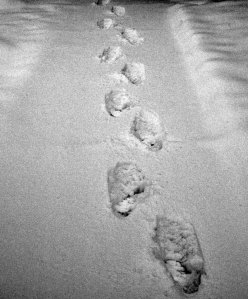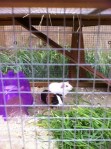The story I wrote and submitted for TMA05:
Pretence
Joseph sat alone on the faded, brown armchair, sipping tepid beer from a lukewarm, green glass bottle. The flat was silent apart from the sound of the refrigerator’s hum and he could smell the sickly flowery scent of the carpet cleaner Brigitte used on the tattered orange carpet. Outside the eighth storey window rain splattered against the glass to make his view of the neighbouring empty streets and grey high rise buildings bleed down the pane.
A small box shaped television stood silent in the corner, a photograph of himself and Brigitte on their wedding day beaming down from its top. He remembered it had rained that day too. A grey drizzle across East Berlin that left the pavement outside the registry office with a surreal, polished appearance. Not that Brigitte had minded, radiant in white crepe and frills, even the cardboard wedding cake had not dampened her mood.
Joseph rose and walked to the small, beige tiled kitchen to get another bottle. They had not done badly by DDR standards having been granted a two-bedroom flat in a decent enough neighbourhood. Their two children, Christina and Stefan, were active in the Young Pioneer Movement; Christina had recently read a poem aloud at the Labour Day Celebrations, and although his job in the meat packing factory was mundane Joseph felt settled.
He sighed and reached into the refrigerator to grasp another bottle. The cold, dry air enveloped his skin and he closed his hand around the ice cold glass, withdrawing quickly to remove the lid with a hiss. He gulped a mouthful, the cold sour liquid a brief shock to his system, and padded across the hallway into the children’s bedroom. Two single beds stood on opposite sides of the room, perfectly made, and his eyes took in the blue curtain on its rail that split the room exactly in half; Brigitte’s idea to stop them squabbling, ever the peacemaker. His eyes fell upon the photograph of Stefan in his Pioneer uniform on the chest of drawers. He didn’t have a lot of time for the boy if he was brutally honest. Stefan was an uncomplicated child who showed little interest in the world around him. It was Brigitte’s influence; she was always happy to go along with the status quo. The urge to laugh rose in his chest and the bitter taste of the beer choked him. He should be pleased for them he supposed but words of congratulations lay strangled in his throat right now.
‘You have been here for one month now’.
Joseph lifted his head from where his chin sat on his chest and raised his heavy eyes to the stout, bald man sat in front of him. He had lost track of time since he had arrived here. They had driven round the city for hours before he was blindfolded en route and led inside this building. His time in the cold, damp cell was punctuated only by the trek along a dimly lit corridor where he could hear grunts, shouts and sometimes whimpers from his fellow prisoners. His shoes would stick to the beige patterned lino as he walked, careful not to trip on the hems of his uniform, to this room where the faint scent of vomit, damp and antiseptic mixed with that of newly opened packets of paper and where a heavy metal door shut and locked behind him with a clang.
The two officers were always the same. They had met him on arrival where they silently took his fingerprints, stripped him in a cold, brightly lit room and issued him with an oversized, faded blue uniform that smelled strongly of mildew and felt damp against his skin.
Under any other circumstances Joseph would have sneered openly at them; typical Stasi – bland, ill-educated men who spoke in guttural tones. Except now they held the power; he had learned this the hard way. Their first tactic had been sleep deprivation. They would allow him to drop off on the cold, hard mattress and then come in and rouse him by glaring bright lights into his eyes until he woke with a start, their sour breath heavy in his nostrils. After experiencing this for less than 2 weeks Joseph knew he was ready to break and had conceded a few names to them. An attempt at communication with a guard, however, had led to complete isolation for a further two weeks. Joseph now shook when lifting his head to meet the eyes of his captors and even looked forward to the interrogations to break the monotony.
He should feel ashamed, he knew that. He had denounced confessors and informers loudly and at length during clandestine meetings of the One Germany Group after hours in the University canteen. He wondered who had informed on him. It would be easy to blame someone working late in the kitchens, but he knew it was more likely to be one of his fellow conspirators.
Having never been formally introduced to his officers Joseph knew them only as One and Two. Nausea welled up in his stomach now as One scraped back his orange plastic chair and pulled open the tattered green curtain to allow for a brief glimpse of the identical grey blocks outside. Joseph squinted; his red, dry eyes stinging mercilessly and watering at the contact with bright sunlight. He finally forced himself to look away, back at Two who was examining his nails. Joseph focused on his yellowed fingers through tear filled eyes. His nails were cracked and full of dirt. Maybe he worked on an allotment in his spare time as his own father had done.
One sat and dragged the chair back under the table, clasping his bony hands together on the scratched wooden surface, ‘go back to your family Mr Degner, sign the confession and comply with our wishes and you can go home’.
At their last meeting they had told Joseph that his mother was in a Psychiatric Hospital after a suicide attempt, that she couldn’t stand the shame of her son being under investigation. He hadn’t believed them then, not fully, it was a trick well known by dissenters, but now his mind wandered to the possibility that it was true. It would not be a secret that he had been taken away, his family was sure to know and the Stasi officers would have visited them regularly since he was detained.
‘I will sign your confession,’ the parched voice that left his flaking, cracked lips did not sound like his own, ‘but I don’t understand what you mean by demands? I have nothing left, no university career, no prospects, nothing. You know you will see to that and that your confession will seal it’. What could they possibly want after this? More names he supposed. He had already given them too many and his colleagues must know who had sold them when they were arrested.
One unfolded his hands and pushed the crisp white sheet of paper sitting to his left towards Joseph with the index finger of his right hand and handed him a chewed plastic pen with his left. Joseph hastily scribbled his name as the printed words swam in front of his eyes and One reached to snatch the paper back and check the signature.
The two men nodded in agreement and set the paper back down between them. The silence dragged and Joseph felt sweat breaking out across his jagged shoulder blades.
‘Is it names your after? I’m not sure who else would be of use to you to be honest’.
Two smirked again, his face cracking into deep wrinkles across his cheeks and under his heavily lidded eyes, ‘no Mr Degner, not names, although anyone in a deviant group is of interest to us should you wish to offer them. No, what we would like from you will be much more comfortable. You may even enjoy it’.
It hadn’t taken him long to pursue and woo Brigitte. They were pleased with him. They had wanted someone they knew they could rely on, someone who could be on the inside of the otherwise impenetrable Sammer family and what better way than to marry off their youngest daughter to an informant.
When they met Brigitte was a loyal subject, on that Joseph was sure. The rest of the family on the other hand were another matter. Her older brother, Karl, had defected over the wall at the end of the 1960s and her father had written for radio plays until he started to cut a little too close to the bone for the system. He had been re-educated as a city taxi driver.
In all their years of marriage Joseph had never seen so much as a hint of subversion from Brigitte, who often claimed she had no interest whatsoever in politics. Her only desire was for her family to be happy. He told himself that he would not have informed on her even if he could, but he knew this was untrue.
He had, on the other hand, passed on snippets about her father’s lack of satisfaction with his job and her mother’s frequent rants regarding the lack of fresh fruit and vegetables in the shops or the waste of public spending on the Labour Day Parade. They wrote it all down, filed it in black box files that sat beside the desk and he went home afterwards, pretending to be normal; negotiating the children’s squabbles, going to work, sitting round the table like a family, sleeping in the same bed as the woman he called his wife.
Joseph took another swig from the can and exited his children’s bedroom. It wouldn’t be long. They would know by now and the apparatus of the state would be gathering to bring him in for questioning. Of course he must have known, had concealed it from them; it was only a matter of waiting now. There would be no escape.
The truth was he hadn’t had a clue and had been plodding along as he had everyday for the last 10 years. He wondered if Christina and Stefan had known. He suspected not, she wouldn’t have been stupid enough to risk detection that way. He wondered if they realised that he wasn’t going to join them yet. They would be halfway to Bulgaria by now and were probably too terrified to think about him. He was surprised that the thought saddened him.
Re-entering the living room he sank back down into the armchair, the broken spring digging into the small of his back. He shifted his weight slightly and re-read the letter he had found on his return from work:
Dear Joseph,
You know I love you and that our children love you but I cannot stay here. The sad truth is that there is no future in this country, not anymore. Everyday I hear of someone else who has disappeared, good people Joseph, people I have worked with for years. I accepted what happened to Father and even thought it was his own fault. He criticised our nation when we were all trying so hard to build something. I accepted that Karl would never return, that he had defected to the West, but now I look at our children and I see nothing for them and I know that if I stay here I will watch them dwindle and fail while I myself become a walking corpse dependent on pills like Mother in order to plod on.
I do not leave you easily, please know that and please also know that the route we will take to the West is as safe as it could be. Karl has arranged it all and will meet us on the other side. I only leave because I know that you will be fine. You are a good man, happy in your life here and I know that you will not be blamed.
All my love forever, I hope that one day we will reach better times and will be reunited,
Brigitte.
Joseph ran a finger over the scribbled words and his chest tightened. He placed it back on the arm of the chair and waited.










